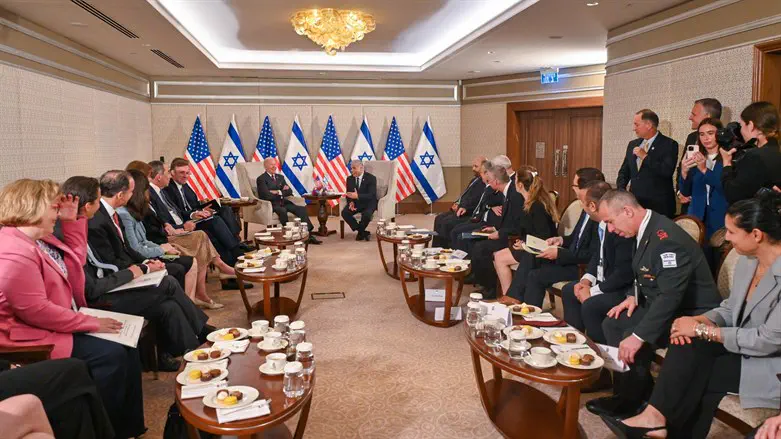
On Thursday, the second day of US President Joe Biden's visit to Israel, Biden met with Israel's interim Prime Minister, Yair Lapid at the Waldorf Astoria Hotel in Jerusalem.
The two leaders met tete-a-tete first, without any advisers, and then their teams joined them for a working meeting.
During the meeting, Lapid requested of Biden that the United States refrain from returning to the Iran nuclear agreement, in light of the risks inherent in doing so, both for Israel and for the entire region. He proposed instead that the US should involve the UN Security Council and act in tandem with the organization in order to increase sanctions on Iran.
Biden responded that the Americans were interested in reaching an agreement with Iran, but that their attempts to persuade the Iranians to agree to an acceptable solution were by nature limited. He did not clarify how long a diplomatic solution would remain on the table.
The Israeli Prime Minister also noted that Israel is very interested in seeing the Abraham Accords signed with more countries in the region.
On the Palestinian issue, Biden asked Lapid not to "surprise" his administration with regard to settlement construction. The two leaders agreed that the administration would be updated prior to certain steps and Lapid clarified that his government's policy had not changed following the transfer of power from Naftali Bennett to himself.
Biden did not raise any special requests with regard to the Palestinians, nor was the issue of a Palestinian consulate in Jerusalem broached during the meeting between the two.
However, clear messages were conveyed to the American side prior to the meeting, stressing that Israel is not prepared to see a Palestinian consulate open in the nation's capital.
Instead, Lapid and Biden discussed various measures cited by Lapid that have been instituted to improve the quality of life for Palestinians in various areas.
During the extended meeting, the parties discussed at length various regional issues, focusing on Iran and the nuclear question. Prime Minister Lapid also thanked President Biden for his decision not to remove the Islamic Revolutionary Guard Corps from the list of FTO international terrorist organizations.
The leaders welcomed the two joint declarations between the countries, first and foremost, the Jerusalem Declaration to be signed today, as well as the joint declaration on strategic cooperation in the field of advanced technologies. They also expressed their satisfaction at the first I2U2 Leaders Forum which was held virtually shortly after the two leaders met.
Both Biden and Lapid also instructed their professional echelons to complete the visa waiver process soon.
The Israeli team consisted of bureau chief of staff, Danny Wesley, the head of the National Security Council and the National Security Adviser, Dr. Eyal Hulta, the Prime Minister's secretary Shalom Shlomo, the Director General of the Prime Minister's Office, Naama Schultz, the Director General of the Ministry of Foreign Affairs, Alon Ushpiz. Gil, Political Adviser Yair Zivan, Deputy Chief of Staff Avivit Bar-Ilan, and the Israeli Ambassador to the United States Mike Herzog.
On the American side, US Secretary of State Anthony Blinken, US National Security Adviser Jake Sullivan, and US Ambassador to Israel Tom Nides participated.

